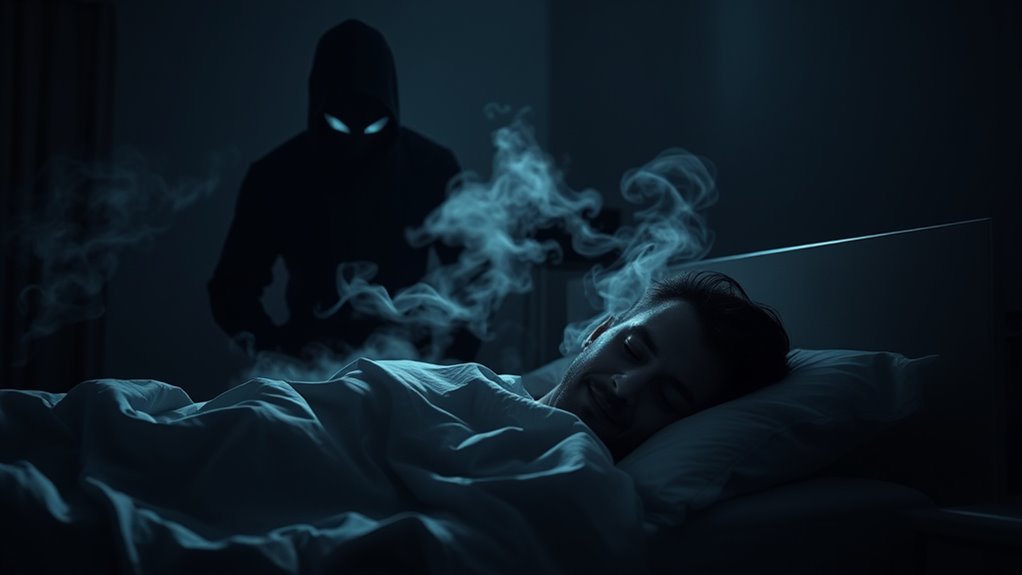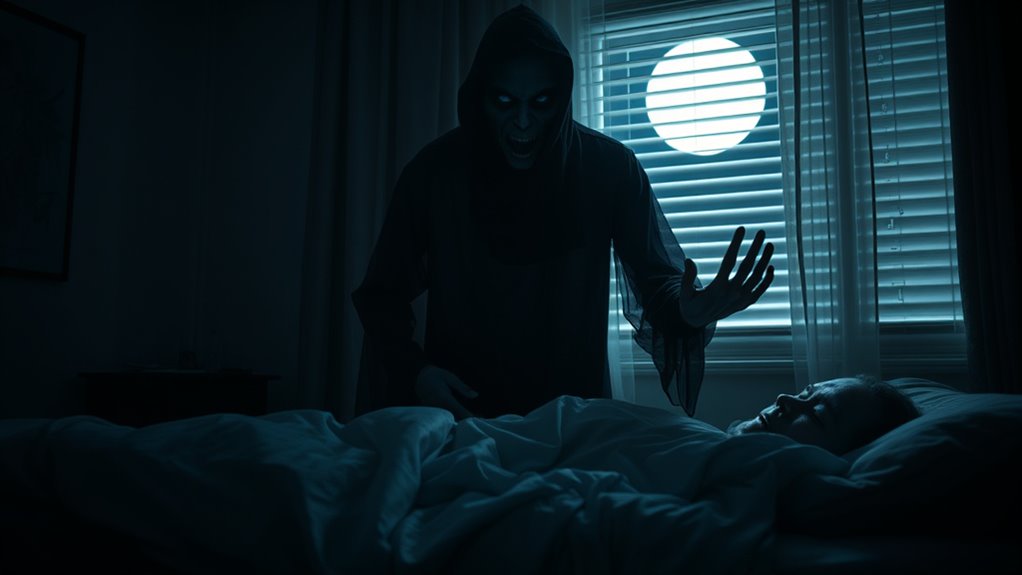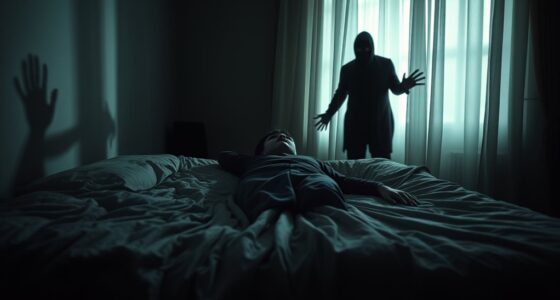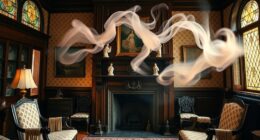Sleep paralysis happens when your brain wakes up before your body, causing temporary paralysis and vivid hallucinations that often feel like supernatural visitations. Science tells us these experiences are normal parts of sleep progressions and involve brain processes like hallucinations during hypnagogic states. While your mind might interpret these sensations as spirits or otherworldly beings, they’re simply natural phenomena. To understand more about how your brain creates these experiences, keep exploring what science says about sleep paralysis and nighttime sensations.
Key Takeaways
- Sleep paralysis results from the brain awakening before the body, causing temporary paralysis and often hallucinations, without supernatural influence.
- Nighttime visitations are typically hallucinations during hypnagogic or hypnopompic states, rooted in normal brain functions during sleep-wake transitions.
- Scientific research shows that sensations like a presence or voices are vivid dreams or hallucinations, not evidence of supernatural entities.
- Differentiating natural hallucinations from supernatural interpretations involves understanding sleep stages and the neurological basis of perceptual experiences.
- Maintaining good sleep hygiene and practicing lucid dreaming can help manage episodes and reduce fear of these natural phenomena.

Many people experience vivid, unsettling episodes during the night, but these moments can be confusing—are they just sleep paralysis or something more supernatural like nighttime visitations? Understanding what’s happening requires exploring both the science of sleep paralysis and the possibility of supernatural encounters. Sleep paralysis occurs when your mind wakes up before your body, leaving you temporarily unable to move. During this state, you might see or feel a presence in the room, which can be frightening. It often happens during passages between sleep and wakefulness, especially if your sleep hygiene isn’t essential. Poor sleep habits, stress, or irregular sleep schedules increase the likelihood of sleep paralysis episodes. Fascinatingly, some people use lucid dreaming techniques to better understand or even control these episodes. Lucid dreaming involves becoming aware that you’re dreaming and sometimes even influencing the dream’s content. By practicing lucid dreaming, you can sometimes reduce the fear associated with sleep paralysis, as you learn to recognize it as a natural, temporary state rather than an ominous visitation.
Good sleep hygiene plays a vital role here. Creating a consistent sleep schedule, avoiding caffeine or screens before bed, and ensuring your sleep environment is comfortable can considerably decrease the chances of sleep paralysis. When you’re well-rested, your brain processes and transitions through sleep stages more smoothly, reducing disruptions that lead to episodes. If you’re curious about nighttime visitations, it’s important to distinguish between scientific explanations and personal beliefs. Many report feeling a tangible presence or even hearing voices during these episodes, which some interpret as supernatural encounters. However, from a scientific point of view, these sensations often align with vivid dreams or hypnagogic hallucinations—dream-like images that occur as you’re falling asleep or waking up. These hallucinations can feel very real but are rooted in your brain’s normal functioning. Recent advances in understanding sleep paralysis have shed light on its neurological basis, helping to demystify these experiences.
While some interpret these experiences as supernatural, understanding the underlying sleep processes helps demystify them. Maintaining good sleep hygiene and exploring lucid dreaming can empower you to manage or even reduce episodes of sleep paralysis. Recognizing the difference between a natural, neurological event and a supernatural experience can help lessen fear and anxiety. Ultimately, learning about your sleep patterns and practicing healthy habits allows you to navigate these episodes more confidently, whether they’re simply a part of your sleep cycle or something more mysterious.
Frequently Asked Questions
Can Sleep Paralysis Be a Sign of a Neurological Disorder?
Sleep paralysis can sometimes be a sign of a neurological disorder, especially if you experience frequent episodes along with other neurological symptoms like muscle weakness, vision changes, or coordination issues. While it’s often linked to sleep disorders such as narcolepsy or insomnia, persistent sleep paralysis warrants medical attention. A healthcare professional can evaluate your symptoms to determine if an underlying neurological condition is contributing to your episodes and recommend appropriate treatment.
Are Nighttime Visitations Linked to Specific Cultural Beliefs?
Nighttime visitations are often linked to specific cultural beliefs and interpretations. You might see hallucination phenomena during these experiences, which cultures interpret differently—some see them as spirits or ancestors, while others view them as supernatural entities. These cultural interpretations influence how you perceive and respond to the phenomena, shaping your experience and understanding of what’s happening. Recognizing these cultural influences helps clarify your feelings and reactions during such episodes.
How Does Stress Influence the Likelihood of Sleep Paralysis?
Imagine someone under intense exam stress, feeling overwhelmed and anxious. Stress triggers can substantially increase your risk of sleep paralysis by disrupting your emotional regulation. When you’re stressed, your body stays in a heightened state, making it harder to shift smoothly into REM sleep. This emotional imbalance can cause episodes of sleep paralysis, where you feel trapped or unable to move, especially during high-stress times.
Can Age or Gender Affect the Experience of Either Phenomenon?
Age differences and gender variations can influence your experience of sleep paralysis and nighttime visitations. Younger individuals may be more prone to these phenomena due to sleep pattern changes, while gender differences suggest women might report more vivid or frequent episodes. You might notice that your age or gender impacts how intense or frequent these experiences are, with hormonal or social factors playing a role. Recognizing these variations helps you better understand your unique sleep experiences.
Are There Effective Treatments to Prevent Sleep Paralysis Episodes?
Think of preventing sleep paralysis like calming a restless sea. You can reduce episodes by practicing good sleep hygiene, like sticking to a consistent schedule and avoiding caffeine before bed. Relaxation techniques, such as deep breathing or meditation, also help by easing your mind and body. These strategies create a peaceful environment for sleep, making episodes less likely and helping you wake up feeling more refreshed and in control.
Conclusion
Understanding sleep paralysis and nighttime visitations is like traversing a shadowy forest—you never quite know what you’ll encounter. Imagine waking up, feeling a weight pressing down, just like a heavy blanket, but then hearing whispers of a loved one’s voice—it’s unsettling, yet deeply human. Studies show that 8% of people experience sleep paralysis at least once, blurring the line between reality and dreams. Knowing the science helps you find clarity amid these mysterious nighttime encounters.









